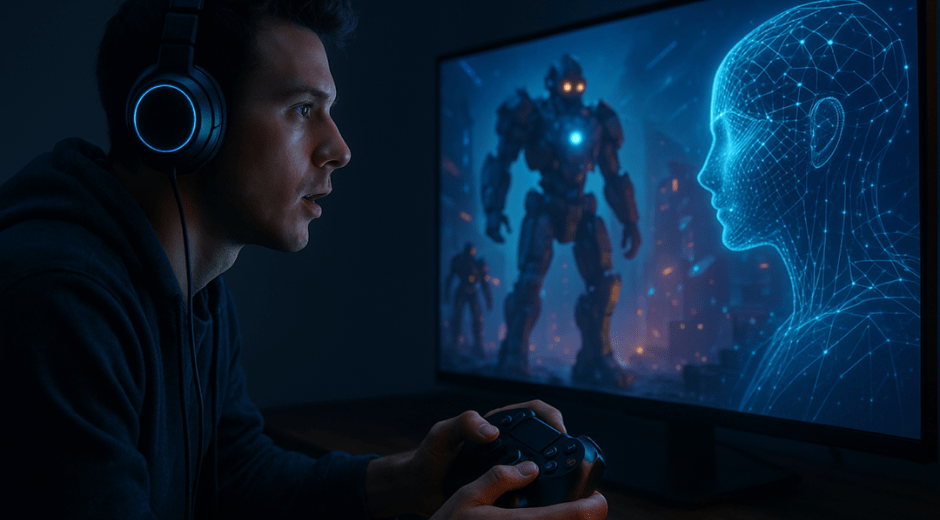AI in Gaming: How AI Shapes Player Experience and Gameplay
AI in Gaming: How AI Shapes Player Experience and Gameplay
The world of gaming is evolving faster than ever. Artificial Intelligence (AI) is no longer a background tool—it’s becoming a core part of how games are designed, played, and experienced. From non-player characters (NPCs) that behave realistically to dynamic storylines that adjust to player choices, AI is transforming the very essence of gaming.
At GamingNewsHead, we explore the latest trends in AI integration and how it’s reshaping the gaming landscape for both developers and players worldwide.
1. AI-Powered NPCs: Making Games More Immersive
Non-player characters have always been a part of gaming, but traditional NPCs often followed predictable patterns. AI changes that by introducing adaptive behavior, learning from player actions, and creating more engaging interactions.
In open-world games, AI NPCs can now remember player choices, react differently in various scenarios, and even initiate their own storylines. This creates a sense of immersion that makes every playthrough unique. Players no longer feel like they are interacting with pre-programmed scripts; they engage with a living, responsive environment.
2. Procedural Content Generation: Endless Possibilities
One of the most exciting applications of AI in gaming is procedural content generation (PCG). AI algorithms can generate entire worlds, levels, quests, or challenges dynamically. This means that every player’s experience can be unique, extending replay value and keeping communities active.
For example, some survival and exploration games now use AI to craft new terrain layouts, resource placements, and enemy encounters on the fly. This ensures that no two sessions feel identical, enhancing engagement and giving developers a way to offer near-infinite content without manually designing every detail.
3. Personalized Gaming Experiences
AI is also being used to tailor gaming experiences to individual players. By analyzing gameplay data, AI can adjust difficulty levels, recommend strategies, and even suggest in-game content that matches a player’s style.
This personalization ensures that beginners are not overwhelmed while experienced players are consistently challenged. It also allows developers to better understand their audience, fostering stronger communities and more satisfying gameplay experiences.
Platforms like Microsoft are pioneering AI tools that enable these personalized adjustments, from dynamic matchmaking in multiplayer titles to adaptive story progression in single-player games.
4. Real-Time Decision Making and Smarter Enemies
AI-driven enemies have revolutionized combat gaming. Instead of predictable attack patterns, enemies now analyze player behavior and respond in real time. This forces players to think strategically, making battles more intense and rewarding.
In strategy and role-playing games, AI can also coordinate groups of NPCs, plan ambushes, or adjust tactics on the fly, mimicking human-like decision-making. The result is a gaming experience that feels more alive, where challenges remain engaging even after dozens of hours of play.
5. AI in Game Development: Behind the Scenes
AI doesn’t just affect players—it’s transforming development too. Developers use AI to test games, detect bugs, and even create assets. Procedural animations, realistic textures, and AI-assisted audio generation are now common in high-end titles.
By integrating AI tools, studios can reduce production time, cut costs, and push the boundaries of creativity. Smaller indie developers can also leverage AI to compete with larger studios, democratizing the gaming industry and fueling innovation.
6. Enhanced Storytelling Through AI
Narrative-driven gaming is benefiting immensely from AI. AI can adapt storylines based on player choices, creating branching narratives that feel organic and immersive. Each decision can impact relationships with NPCs, story outcomes, or even the world itself.
This AI-driven storytelling allows developers to craft experiences that feel tailored to individual players. Games become living worlds where player actions have weight, and replaying the story offers genuinely different experiences.
Sites like MetroPropertyHomes have explored the parallels between immersive design in luxury spaces and narrative design in AI-driven games—both rely on attention to detail and tailored experiences.
7. AI Companions and Assistants
In many modern gaming titles, AI companions are now as intelligent as human teammates. They can follow complex instructions, provide tactical support, and even interact socially with players.
For instance, in action-adventure and RPG games, AI companions can plan strategies, warn of dangers, or offer guidance without breaking immersion. This makes solo play feel more dynamic, while also enhancing multiplayer experiences by complementing human teammates.
8. Ethical Considerations in AI-Driven Gaming
With great power comes great responsibility. AI in gaming raises ethical questions, from data privacy to algorithmic fairness. Personalized gaming experiences rely on data collection, and developers must ensure that player information is secure and used responsibly.
Moreover, AI-generated content can sometimes introduce biases or unintended consequences in gameplay. Responsible use of AI ensures that gaming remains fair, inclusive, and enjoyable for everyone.
9. The Future of AI in Gaming
Looking ahead, AI will continue to redefine what’s possible in gaming. We may see fully adaptive worlds, AI Dungeon Masters in tabletop-style games, and virtual environments that respond intelligently to emotions and player input.
The integration of AI is not just about enhancing graphics or mechanics—it’s about creating deeper emotional and interactive connections between players and the game world. As AI evolves, the line between player and environment will blur, resulting in richer, more immersive experiences.
Artificial Intelligence is no longer a background feature in the industry—it is a driving force shaping how games are designed, played, and experienced. From smarter NPCs and procedurally generated worlds to personalized gameplay and AI-assisted development, the possibilities are nearly endless.
By embracing AI, developers can craft experiences that are dynamic, challenging, and tailored to each player. Meanwhile, users enjoy experiences that feel alive, responsive, and unique every time they log in.
For more updates on cutting-edge technology and trends, explore GamingNewsHead. To see how innovation influences other industries, you can also check Microsoft for AI advancements or MetroPropertyHomes for insights on personalized design and immersive experiences beyond the digital world.
Gaming Made Simple

Enemy AI Behaviors That Push Players To Adapt And Improve
Enemy AI Behaviors That Push Players To Adapt And Improve

Inventory Management Systems That Make Or Break RPG Flow
Inventory Management Systems That Make Or Break RPG Flow

Skill Trees That Redefine How You Build Your Favorite Characters
Skill Trees That Redefine How You Build Your Favorite Characters













